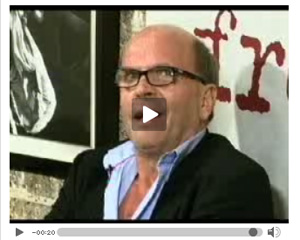The increasingly heated UK press regulation debate continued this week. Yesterday saw former PCC chair, Sir Christopher Meyer, appear on BBC Two’s Daily Politics Show, to defend the body, with criticisms offered by Roy Greenslade.
And here’s an update from an event a few weeks ago during which the Independent’s editor, Roger Alton – a former PCC member – defended the body at a debate hosted at the Frontline Club (reported at this link by Press Gazette). The event is still well worth a watch if you have the time, with a mixed line-up led by Radio Four Media Show’s Steve Hewlett.
Alton, along with Steven Barnett, special advisor for the Media Standards Trust report ‘A More Accountable Press, Part One’, and Albert Scardino, the broadcaster and commentator, hotly debated the current state of affairs.
Alton: “I don’t want to be the only person live on the web speaking up for the PCC.”
Debate host Steve Hewlett said that the PCC had been invited to participate but had chosen not to. Following the claim up, Journalism.co.uk asked PCC director Tim Toulmin why not. He said it was for a couple of reasons:
“First, we are focusing on the select committee inquiry at the moment, and think that the time to debate these big issues is within the context of their report, which of course is a more serious enterprise than the Media Standards Trust’s effort. Secondly, our dealings so far with the MST have shown them to be rude and not particularly well informed – which may sound harsh, but is a reason for not wanting to spend a precious evening being further exposed to their nonsense.”
That’s straight from the press regulation horse’s mouth.
Alton had also been particularly candid and, erm, descriptive in his language during the event – especially before he realised it was going out live. For example:
Alton: “The McCanns was a thing of such astonishing ghastliness by the press, you do indeed feel like viscerating your own bladder with it. I mean, it’s absolutely awful. But you can’t say the whole industry is fucked (…) What’s the basis for this conversation? It’s fairly confidential?”
Hewlett: “It’s being confidentially live broadcast…”
Alton’s face as he looks up to the camera, shown below:

Broadcaster and writer Steve Hewlett offered his take on the debate to Journalism.co.uk at the end of the Frontline event. For Hewlett, the issue is maintaining freedom of expression. “I think the press has always been disliked and it’s always been held in low regard (…) journalists may just be bottom feeders, but democracy is needed. You wouldn’t expect the press to be popular and well-thought of and I’m not surprised by that.”
“Multiplicity of regulation is one of the things that guarantees freedom of expression in a country that is prone to regulating everything out of existence if it can,” he told Journalism.co.uk.
“The last thing you’d want is everyone regulated in the same way,” he added.
Robert Peston is able to have freedom in his BBC blog, but he also has quite a lot of restrictions on what he can say, Hewlett added. “For example, the level of proof the BBC will insist is at a higher level than many of their City [correspondent] counterparts [in newspapers].
“Traditional media that don’t deliver value are going to go out of business,” Hewlett said, adding that there are ‘probably one too many papers’ in the UK.
Hewlett said that the Media Standards Trust had ‘opened the door’ to criticism by the PCC in its review of UK press regulation, for which it consulted an independent peer review group for part one of the ‘A More Accountable Press’ report.
“If you look at the statistics [cited in the report] it’s so easy to question,” Hewlett said, referring to specific examples in the report – for example, that ‘only 0.7 per cent of complaints are adjudicated on’. But, Hewlett said, that omits complaints dealt with by mediation rather than adjudication and complaints that are on the same issue.
While saying that he ‘held no candle’ for the PCC at all, Hewlett said the fact the MST’s authors had been ‘partial’ in the way they presented their data, and that they didn’t raise issues with the PCC prior to publication led to an ‘open goal’ for Sir Christopher Meyer and the PCC, who were able to say the report was partial, misleading and that the PCC hadn’t been appropriately consulted.
